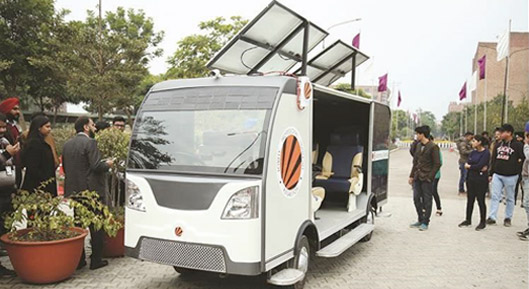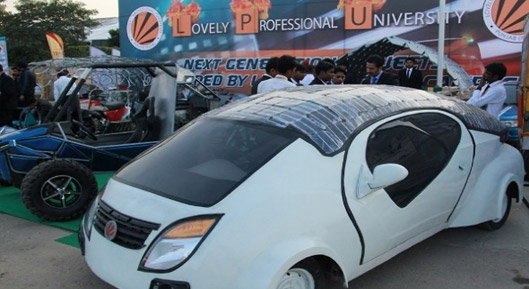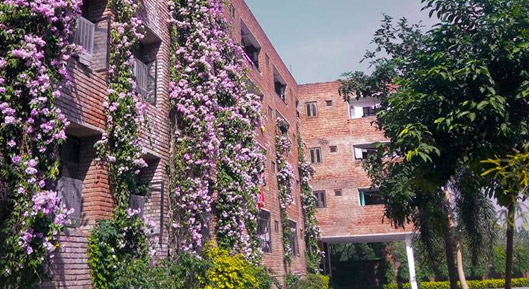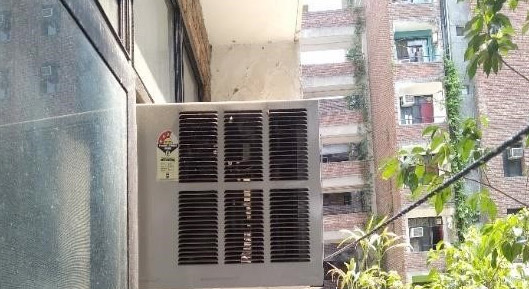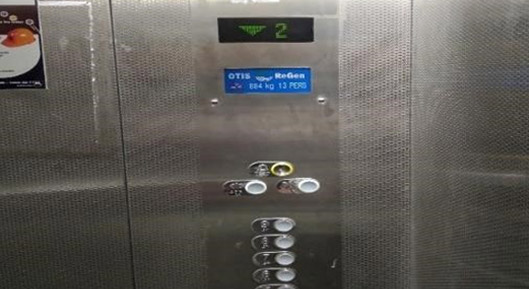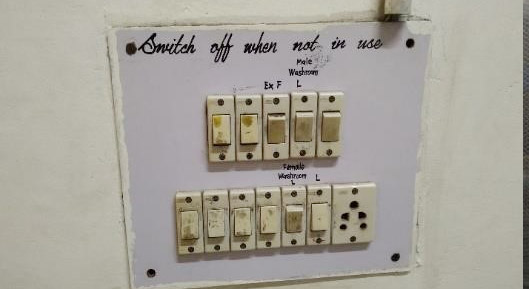Target for Carbon Neutrality
Carbon neutrality is a balance between emitted carbon and absorbed carbon from the atmosphere in carbon sinks. Carbon sink may be referred as any system that absorbs more carbon than it emits. Examples of natural carbon sinks are soil, rivers, forests and sea. Therefore, Lovely Professional University promotes and supports the plantation drives within the campus and also local community to create natural sinks.
University has adopted an eco-friendly bicycle sharing system in 2018 across the campus with the collaboration of Hero Cycles at the campus. LPU has been declared as the country's first ‘Bicycle Friendly University due to the successful implementation of the program. Around 600 bicycles are available for the students on 15+ stands across the campus which are shared by nearly 4000 students per day. The objectives for the green campus have been framed for the vision of 2029 aligned with the national and international guidelines. The 2029 Vision of University states that “By 2029, LPU must transform the university into the green and sustainable campus”.
LPU has a strong dedication towards clean energy deployment, academic programs, research, professional training and consultancy in the field of renewable energy, energy-efficient buildings, energy conservation and management for sustainability. The university has installed a 7.5 MW solar power plant and the energy performance index of the university is 33.42 kWh/m2/year i.e. the consumption is much lower than a 5 star rated building as per Bureau of Energy Efficiency, Government of India. The objectives for the green campus have been framed for the vision of 2029 aligned with the national and international guidelines. The 2029 Vision of University states that “By 2029, LPU must transform the university into the green and sustainable campus”.
Lovely Professional University (LPU) recognizes the pressing global imperative to address climate change and environmental sustainability. As part of our commitment to responsible and environmentally conscious practices, university has undertaken the momentous task of implementing the Greenhouse Gas Protocol (GHG Protocol) throughout our institution. This report outlines our strategic approach to integrating the GHG Protocol into our operations, with the primary goal of aligning our environmental objectives with international best practices and contributing to broader environmental stewardship efforts.
The GHG Protocol, jointly developed by the World Resources Institute (WRI) and the World Business Council for Sustainable Development (WBCSD), stands as a widely acknowledged and respected global standard for measuring, managing, and reporting greenhouse gas emissions. Its comprehensive framework offers precise guidelines and methodologies that empower organizations to accurately assess their carbon footprints and identify opportunities for emission reduction and mitigation strategies.
LPU recognize the transformative power of sustainability initiatives and the urgent need to reduce our carbon impact. By adopting the GHG Protocol, university seek to bolster transparency, credibility, and accountability in our reporting processes. Through meticulous data collection, robust monitoring mechanisms, and continuous improvement strategies, university aim to become a benchmark institution in environmental responsibility and contribute significantly to the global effort in combating climate change.
To ensure the successful integration of the GHG Protocol, university has dedicated team of experts, supported by external consultants where necessary. This interdisciplinary team leads us to a seamless and efficient implementation process, adhering closely to the GHG Protocol guidelines.
A fundamental step in this process involves conducting a comprehensive assessment of our institution's emission sources. LPU has identified and analyzed emissions from various operational facets, including energy consumption, transportation, waste management, and procurement. Accurate and reliable data form the bedrock of effective carbon management. With utmost precision, university has established baseline emission data to measure our progress accurately and set ambitious reduction targets.
To gauge the full scope of our carbon impact, university has adopted the GHG Protocol's Scope 1, Scope 2, and are working on the adaptation of Scope 3 emissions categories. This holistic approach encompasses not only direct emissions from our operations (Scope 1) and purchased energy (Scope 2) but also indirect emissions from our value chain activities (Scope 3). Embracing all three scopes enabled university to identify and mitigate emissions across our entire operational spectrum.
By incorporating Scope 3 emissions, university aim to better understand the emissions embedded in our supply chain. This insight will facilitate exploration of opportunities for supply chain optimization, sustainable procurement, and fostering partnerships with environmentally responsible vendors.
Beyond the intrinsic environmental benefits, our commitment to implementing the GHG Protocol will offer LPU a competitive edge in an increasingly sustainability-conscious marketplace. Investors, customers, and stakeholders are demanding greater environmental accountability, and by measuring and managing our carbon footprint, university demonstrate our dedication to responsible business practices.
As university embark on this transformative journey towards GHG Protocol implementation, LPU eagerly seek the support and engagement of all members of the LPU community. By fostering a culture of sustainability and collaboration, university can collectively achieve our emission reduction targets and contribute positively to global efforts in combating climate change.
At Lovely Professional University, the GHG Protocol serves as a beacon guiding our path towards a more sustainable and responsible future. Through dedicated efforts, transparency, and collaboration, university is determined to set new standards in environmental stewardship within the education sector and beyond. Our commitment to the GHG Protocol reflects our profound responsibility to safeguard the environment for future generations while leaving an indelible mark in the fight against climate change.
Lovely Professional University has taken several initiatives to reduce carbon emissions in line with the GHG Protocol Corporate Standard. These initiatives fall under Scope 1, which covers direct emissions from owned or controlled sources. Here are the three initiatives implemented by the university:
Solar-powered buses, Use of e-rickshaws and Bicycle
Since 2017, the university has been operating solar-powered buses and battery-operated e-rickshaws on campus. These vehicles provide transportation services for students and faculty, connecting various buildings, departments, and hostels. By using these electric vehicles, the university reduces carbon emissions from conventional fuel vehicles and contributes to improving air quality on campus.
Solar Powered Vehicles
Lovely Professional University has launched India's first solar powered, driverless bus, designed and built indigenously.
Link: Click Here
University is promoting research related to solar energy-based vehicles. Various projects at graduate and undergraduate levels are going on to develop carbon free emission-based vehicles. University has constructed Central Fabrication Facility to develop solar energy and biodiesel-based transportation system.
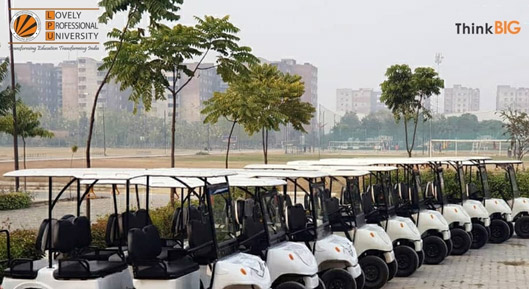
Public Transport (Use of e-Rickshaw)
Lovely Professional University (LPU) has embraced electric mobility as a milestone towards low-cost and eco-friendly transportation. The university has adopted e-rickshaws as a mode of shared fixed-route mobility, offering affordable transportation options to its students. Here are some details about the e-rickshaw system at LPU:
- High-quality vehicles with advanced electric systems: The e-rickshaws used by LPU are of high quality and equipped with advanced electric systems. These systems ensure efficient performance and contribute to reducing carbon emissions compared to conventional fuel vehicles.
- Fast-charging and long-range technology: The e-rickshaws feature fast-charging capabilities and long-range capabilities, allowing them to cover significant distances on a single charge. This technology ensures that the e-rickshaws can operate effectively throughout the day without interruptions.
- Tech-enabled platform connecting students and drivers: LPU likely has a tech-enabled platform or app that connects students with e-rickshaw drivers. This platform enables students to easily access transportation services and provides a convenient means of connecting with available e-rickshaws.
- Intelligent route planning mechanism: The e-rickshaw system at LPU includes an intelligent route planning mechanism. This mechanism, developed by a B.Tech. Mechanical student named Deepak Dhayal, likely optimizes routes to ensure efficient transportation services for students.
- E-rickshaws and golf karts: LPU currently operates 36 e-rickshaws and 10 golf karts within the campus. These vehicles contribute to maintaining a friendly and pollution-free campus environment.
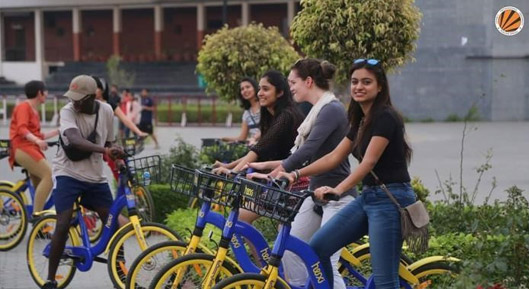
Use of Bicycle
Lovely Professional University (LPU) adopted an eco-friendly system in collaboration with Hero Cycles, which has led to the university being declared as the country's first bicycle-friendly university. This initiative began in January 2018 and has since made significant progress. Here are some details about the bicycle-friendly system:
- Availability of bicycles: LPU has made approximately 600 bicycles available to students, enabling them to use bicycles as a mode of transportation on campus. By providing bicycles, the university encourages students to opt for eco-friendly and healthier transportation options.
- Bicycle stands: The campus is equipped with more than 15 bicycle stands strategically located across the premises. These stands provide convenient parking spaces for the bicycles and make it easier for students to access and secure their bikes.
- Usage and participation: Approximately 4,000 students utilize the shared bicycle system on a daily basis. This indicates a significant level of participation and acceptance of the initiative among the student community.
- Awareness through Hexi-bikes: LPU utilizes Hexi-bikes as a means to raise awareness among students about pollution, unhealthy transportation choices, and traffic congestion. Hexi-bikes likely serve as educational tools or displays that provide information and promote discussions on these topics.
- Hexi Public Bicycle Sharing (PBS) systems: The Hexi PBS systems used by LPU employ automated service, monitoring, and tracking systems. This ensures smooth operations and efficient management of the bicycle sharing program. Additionally, the Smart Ape access system is likely used to facilitate easy access and usage of the bicycles by students.
- By implementing this bicycle-friendly system, LPU aims to promote sustainable and eco-friendly transportation options, reduce pollution and traffic congestion, and raise awareness about the importance of making environmentally conscious transportation choices. This initiative showcases LPU's commitment to creating a campus environment that supports and encourages sustainable practices among its student community.
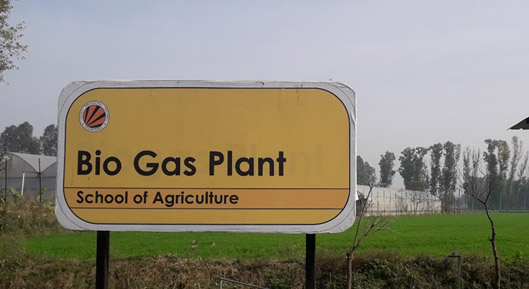
Biogas generation from organic waste
The university utilizes organic waste to produce biogas, which is a renewable source of energy. This helps in reducing greenhouse gas emissions and preventing waterway pollution. The campus has three cubic meter biogas systems that process kitchen waste, producing biogas consisting of methane, carbon dioxide, and trace amounts of other gases. This biogas can be used as an alternative to conventional energy sources.
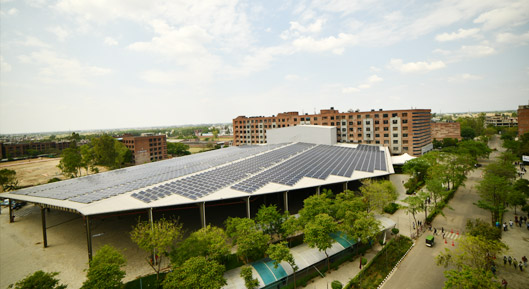
Moving on to Scope 2
which covers indirect emissions from the generation of purchased electricity, the university has made significant progress in reducing electricity consumption and increasing renewable energy generation:
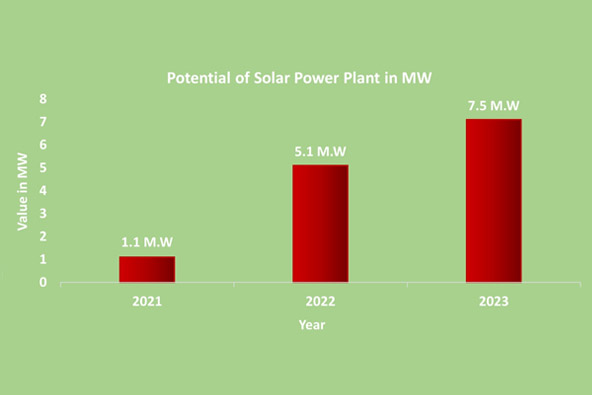
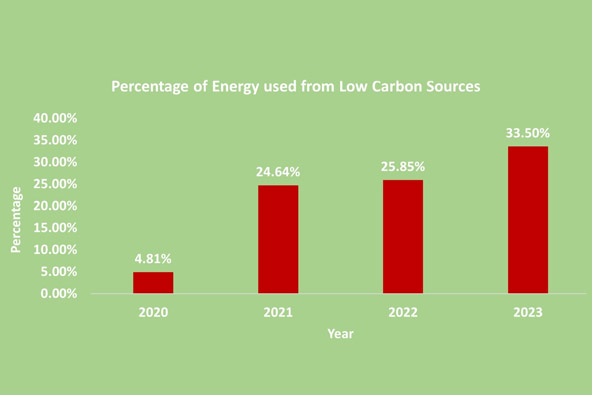
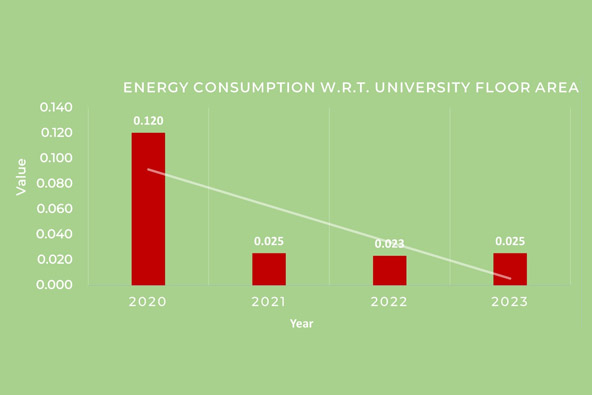
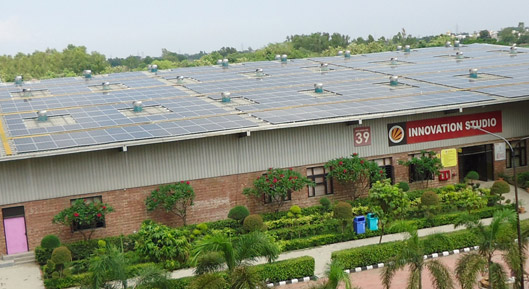
These efforts align with the university's commitment to the sustainable development goals set by the United Nations. The installation of rooftop solar PV plants and the potential of 7.5 MW solar power plant further highlight the university's dedication to utilizing renewable energy sources and reducing its carbon footprint.
emissions refer to indirect greenhouse gas emissions that occur from sources outside the university's direct control but are related to the university's activities. Some of the initiatives related to scope 3 are:
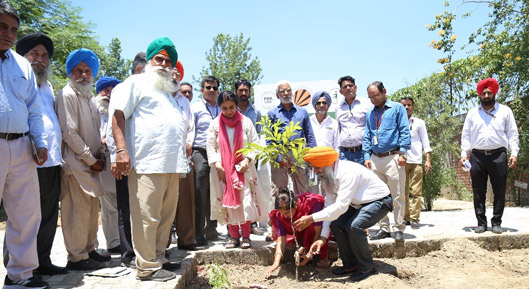
LPUNSS under the aegis of Community Service Cell, Division of Student Welfare organized Tree Plantation Drive under Van Mahotsav which is a commendable effort towards promoting environmental conservation and sustainability. NSS Volunteers and faculty members. Planted over 450 samplings on the university campus demonstrates a strong commitment to creating a greener and more eco-friendly environment.

Lovely Professional University-National Service Scheme (LPU-NSS) had run a campaign for environment protection on World Environment Day. NPU-NSS made people aware by planting trees in different parts of the country. Under the “My Pet Plant” project by LPU-NSS, the volunteers took the responsibility of adopting a sampling and rearing it.

On the ocassion of World Earth Day, LPU-NSS had run a plantation drive to keep earth clean and green. In this drive volenteers, faculty members and LPU dignitories took a plantation to protect Earths natural resources for future generations. Some of the other’s initiatives that are taken by university for reducing Scope 1,2 and 3 emissions are as under:
Energy Efficient Buildings
Energy Efficient Buildings: In an era of smart cities, sustainable buildings and contemporary interiors, University designed an energy-efficient building with specialized architects. They have also trained our students to become lateral thinkers by focusing on the critical design approach. With exposure to an international environment, access to the latest tools, software’s and technology, our students also become architects that create buildings and infrastructure that are globally acknowledged. Due to the incorporation of energy-efficient building strategies, the energy consumption density of the LPU buildings is much lower than a 5 star rated building by Bureau of Energy Efficiency, Government of India.

Amphitheatre: The University has 3 amphitheatres of different capacities to conserve the energy by organizing cultural events, competitions, and plays in natural light. The university is committed to increase its numbers in future.
Creepers vertical greening strategies: The objectives for the green campus have been framed aligned with the national and international guidelines. Creepers vertical greening strategies have been adopted for saving energy and reduction of urban heat island effects.
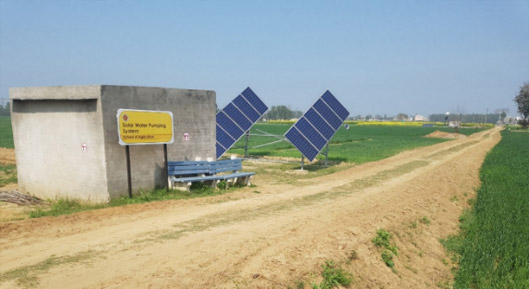
Solar Water Pumping System: Implementing a Solar Water Pumping System at Lovely Professional University (LPU) is a smart and eco-friendly initiative. Solar-powered water pumping systems utilize solar energy to pump water, reducing dependence on traditional grid-connected pumps that run on fossil fuels.
Energy Performance Index:
Energy Performance Index (EPI) in kWh per square meter/year is considered for the rating of the buildings for star label by the Bureau of Energy Efficiency Govt. of India. The energy performance index of Lovely Professional University was + 33.42 kWh/m2/year. For the composite climate of India if a building is having more than 50% of building area than the building is considered 5 star rated building if EPI is below 90 kWh/m2/year. In the case of LPU, the EPI is much lower than Indian standard of 5 stars rating which itself shows efficient management and operation of the building.
Star rating for office buildings as per Bureau of Energy Efficiency, Government of India for major climates of India.| Air-conditioned area > 50% of building area | Lovely Professional University | Star Label |
|---|---|---|
| EPI (kWh/m2/year) | EPI (kWh/m2/year) | |
| 190-165 | - | * |
| 165-140 | - | ** |
| 140-115 | - | *** |
| 115-90 | - | **** |
| Below 90 | 33.43 | ***** |
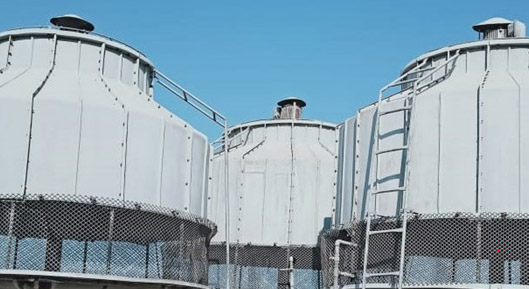
Chiller Plant: In administrative blocks, the University replaced split and windows ACs with 265 TR centralized chiller water-based cooling system. The new system consumes 40% less electrical energy as compared to conventional ACs. University also has a strategy for reducing the consumption of energy by scheduling the running time of the Air condition machines in the daytime as well as peak summer months.
Energy efficiency plan to reduce energy consumption
To reduce the energy consumption at the university level, University has well-defined guidelines to be followed in the university. University has also taken various initiatives to reduce the energy consumption that are listed below.
- The conventional lights have been replaced with LED lights at locations where the working hours are high.
- High power consumption and low efficient lights like mercury vapour lamp were replaced by sodium vapour and metal halide-based lamps.
- The star-rated equipment is used to boost the energy savings, 43% of the total air conditioners installed in the campus are star rated. The regular maintenance of the air conditioners is being done to ensure maximum efficiency.
- Energy-efficient Lifts of make M/s OTIS are used which have Re Gen drive to enhance energy savings up to 75% as compared to the conventional models. 53 out of 83 lifts installed in the campus have a regenerative braking system.
- For the awareness of end-users, stickers are pasted near the switchboard for the conservation of energy and all the users are regularly guided not to miss use the electricity.
- For energy conservation, 50 percent of street lights are turned off at 10:00 p.m., and another 30 percent are turned off at 12:00 a.m. Majority of the students in the campus rely on eco-friendly public transport.
- The bi-cycle facility is available inside the campus area. Nearly 600 bicycles have been made available to students at 15+ stands across the campus which is shared by nearly 4000 students per day.
- To maintain the proper discipline and traffic system inside the campus the University has multiple parking areas.
- University promotes vehicle pooling transportation. Majority of faculties and staff members follow the carpooling system to come university campus.



